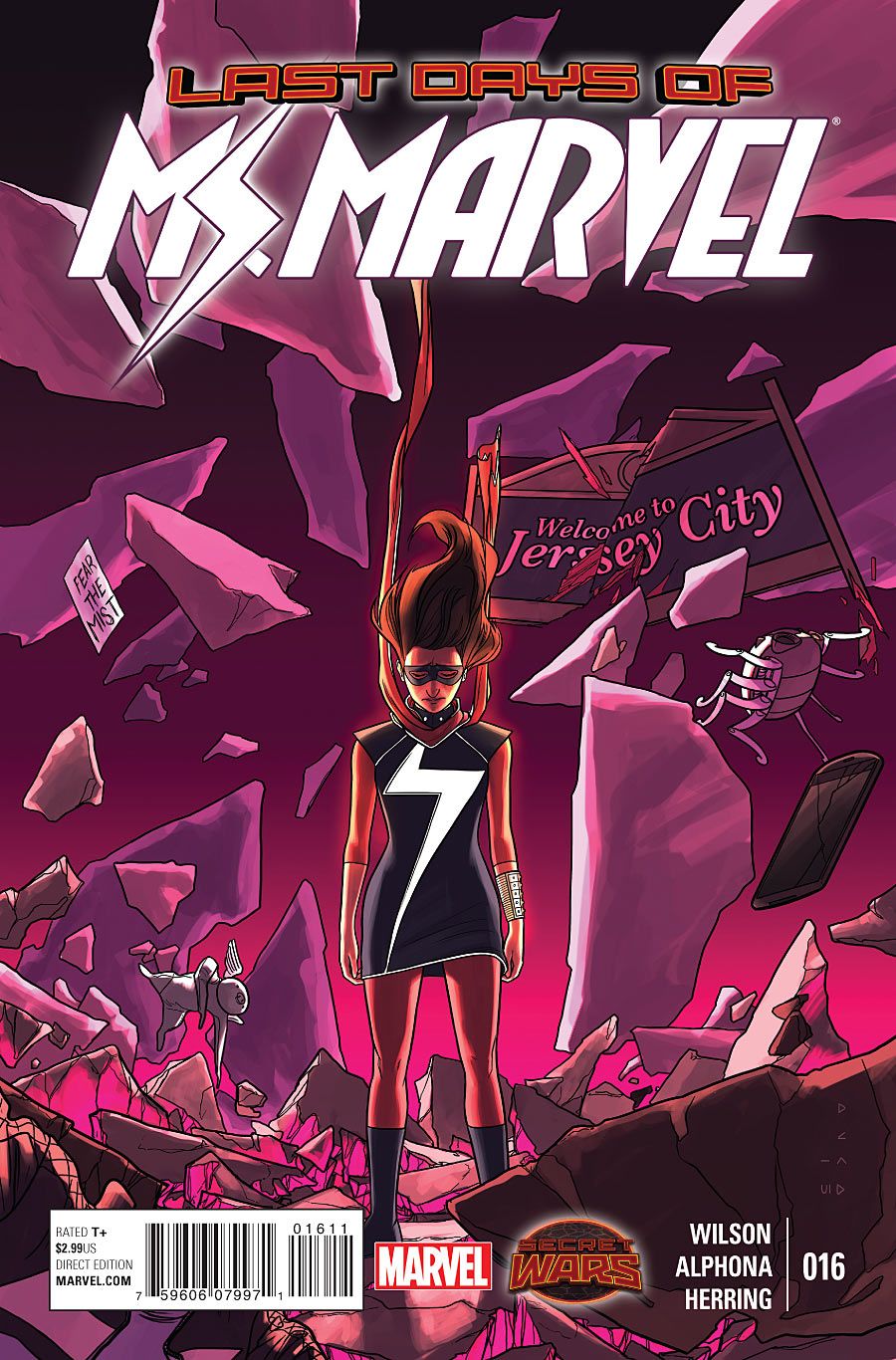In "Ms. Marvel" #16 by G. Willow Wilson and Adrian Alphona, Kamran goes looking for Kamala as she tries to protect her family and fellow citizens in the "Last Days" of Jersey City.
Wilson's comic touch hits the right notes in the opening scene, in which Kamala gets "drunk" on hotdogs to mourn her crush. Wilson gently makes fun of Kamala and parodies breakups in general. I especially enjoyed the crack about the heartbreak affecting her work.
However, as soon as the "Secret Wars: Last Days" threat emerges in the next scene, Kamala's personality and romantic woes take a backseat to the action. Kamala's voice is one of the pillars of "Ms. Marvel" and, if the action upstages her, it needs to be extra exciting or the start of a good mystery. Alphona's panel and page composition fail to make the action look epic. He is strong on details, like the shape of the lights on the pier and the realistic faces of all ages and backgrounds in the crowds. There are lots of great background gags in several panels, like the store canopy for the "Scurvy Lovers Fishhouse." His perspective choice for Kamala's leap into the river is funny and dramatic. Despite this, the mob panic scenes as a whole have less impact than they should.
For the Jersey City scenes, Alphona's page compositions produce a cluttered, unfocused impression. Colorist Ian Herring uses aqua blue and pinkish-red monotones for the lead up to the full-page spread of the eerie descent of a planet. While monotones can simplify and focus the action, they are almost never a good idea, because they always flatten detail. Herring is never boring with his hue choices, but he has consistently had a very narrow range of hue intensity. This has given "Ms. Marvel" a distinctive and homey look of translucent, warm pastels. Now this limitation shows its drawbacks in these large-scale cityscapes. Herring's color flatness combines with Alphona's lack of shading to produce street scenes with almost no sense of depth. The result is that the reader's eye glides over these pages without getting drawn in by any of the texture. Alphona and Herring are a talented art team, but this isn't their best work on the title. It doesn't help that Wilson's dialogue and textboxes for these pages are bland. Usually, Wilson finds a way to make old superhero cliches feel new again, but both Kamala's thoughts on the breakdown of the rule of law and her conversation with Bruno and Vick read like filler. They do nothing to build up the tension for the apocalyptic stakes.
The return of the dreaded Kamran in the next scene has more teeth. Kamran's speculations about the appeal of orthodoxy for Kamala's brother Aamir are deliciously poisonous, as is his nasty dig at Kamala's failure to be a perfect Muslim and "good girl." However, Kamran is still two-dimensional as a villain. Lines like "the age of the true Inhumans has begun" feel cartoonish and naïve next to his observant jabs about Kamala's family. Alphona's faces and bodies are excellent in this scene, especially for Kamala's emotions. Kamala's dad looks huge in first panel on the stairs, but this exaggeration just enhances the relief and humor of the moment. The cliffhanger manages to be a surprise, despite how inevitable it seems in retrospect. Kudos are due to Wilson and Alphona for their timing and pacing during this meet-up.
It's still one of the best titles on the stands, but the plotting and art are uneven in "Ms. Marvel" #16. Wilson's balance of humor and drama is still a sweet spot, and Kamala hasn't lost her appeal. The focus on community, especially Kamala's family and friends, has always been one of narrative strengths. "Ms. Marvel" #16 imperfectly juggles the personal angle and end of the world.

